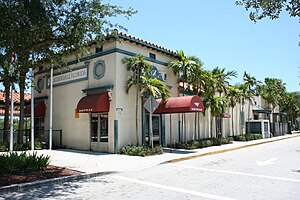Fort Lauderdale, FL | |||||||||||||||||||||||||||||||||||
|---|---|---|---|---|---|---|---|---|---|---|---|---|---|---|---|---|---|---|---|---|---|---|---|---|---|---|---|---|---|---|---|---|---|---|---|
 Northwest view of historic former Seaboard Air Line Railway (now Amtrak) station | |||||||||||||||||||||||||||||||||||
| General information | |||||||||||||||||||||||||||||||||||
| Location | 200 Southwest 21st Terrace Fort Lauderdale, Florida United States | ||||||||||||||||||||||||||||||||||
| Coordinates | 26°7′10.09″N 80°10′11.54″W / 26.1194694°N 80.1698722°W | ||||||||||||||||||||||||||||||||||
| Owned by | Florida Department of Transportation | ||||||||||||||||||||||||||||||||||
| Line(s) | South Florida Rail Corridor | ||||||||||||||||||||||||||||||||||
| Platforms | 2 side platforms | ||||||||||||||||||||||||||||||||||
| Tracks | 2 | ||||||||||||||||||||||||||||||||||
| Train operators | Amtrak, Tri-Rail | ||||||||||||||||||||||||||||||||||
| Connections | |||||||||||||||||||||||||||||||||||
| Construction | |||||||||||||||||||||||||||||||||||
| Parking | Yes | ||||||||||||||||||||||||||||||||||
| Bicycle facilities | Racks | ||||||||||||||||||||||||||||||||||
| Accessible | Yes | ||||||||||||||||||||||||||||||||||
| Other information | |||||||||||||||||||||||||||||||||||
| Station code | Amtrak: FTL | ||||||||||||||||||||||||||||||||||
| IATA code | ZFT | ||||||||||||||||||||||||||||||||||
| Fare zone | 4 (Tri-Rail) | ||||||||||||||||||||||||||||||||||
| History | |||||||||||||||||||||||||||||||||||
| Opened | 1927 | ||||||||||||||||||||||||||||||||||
| Rebuilt | 1986 | ||||||||||||||||||||||||||||||||||
| Passengers | |||||||||||||||||||||||||||||||||||
| FY 2023 | 39,143[1] (Amtrak) | ||||||||||||||||||||||||||||||||||
| Services | |||||||||||||||||||||||||||||||||||
| |||||||||||||||||||||||||||||||||||
| |||||||||||||||||||||||||||||||||||
| |||||||||||||||||||||||||||||||||||
Fort Lauderdale station is a train station in Fort Lauderdale, Florida. It is served by Tri-Rail and Amtrak. The station is located on Southwest 21st Terrace, just south of West Broward Boulevard. The station has two side platforms connected by an elevated passageway. The station building, parking lot, and bus stops are located west of the southbound platform.
History
[edit]
The original station, which is used by Amtrak, is a former Seaboard Air Line Railway depot built in 1927. Designed in the prevalent Mediterranean Revival style by Gustav Maass of the West Palm Beach architectural firm Harvey & Clarke, it is virtually identical to the Hollywood Seaboard station to the south. The station took the place of a temporary structure that had been hastily erected at the end of 1926 to greet the January 1927 arrival of the first Seaboard passenger train in South Florida, the Orange Blossom Special.
The station was served by the Orange Blossom Special until 1953 and, among other Seaboard trains, the Silver Meteor beginning in 1939. Amtrak maintained Silver Meteor service to the station when it took over intercity passenger train service in 1971. Both the Silver Meteor and Amtrak's Floridian continue to use the station.
On January 9, 1989, the Tri-County Commuter Rail Authority began Tri-Rail service to the station, building additional facilities and a pedestrian overpass just north of the original station. A park and ride lot is available, and is directly accessible via a proprietary exit from Interstate 95 north.
The station consists of a passenger waiting room on the northern end and a baggage room in the center section. On the southern end is a freight room, which is used by CSX, the successor to Seaboard. Just south of the street side entry to the passenger waiting room, and representative of the racial segregation laws of the era in which the station was constructed, is the entrance to what had been the "colored" waiting room.
On November 10, 2024, the Silver Star was merged with the Capitol Limited as the Floridian.[2]
References
[edit]- ^ "Amtrak Fact Sheet, Fiscal Year 2023: State of Florida" (PDF). Amtrak. March 2024. Retrieved June 27, 2024.
- ^ "Amtrak Launching the Floridian, with Daily Service Between Chicago and Miami" (Press release). Amtrak. September 23, 2024. Archived from the original on September 23, 2024. Retrieved September 23, 2024.

